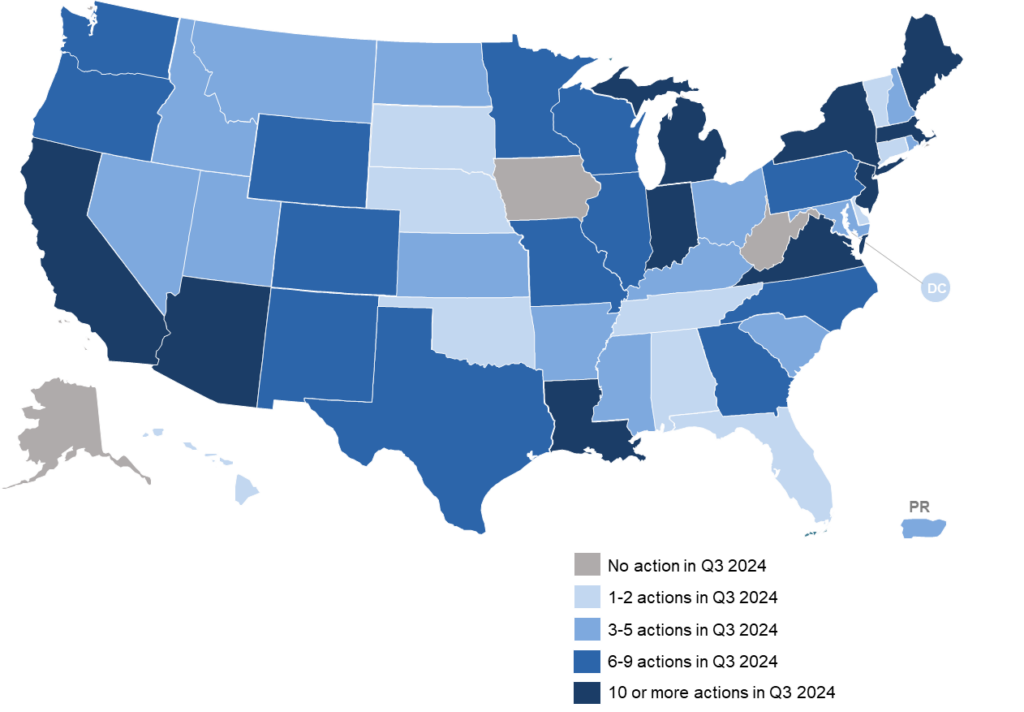50 States of Power Decarbonization Q3 2024: States Consider Treatment of New Large Load Customers and Options for Customer Purchase of Nuclear Energy
Raleigh, NC – (November 19, 2024) The NC Clean Energy Technology Center (NCCETC) released its Q3 2024 edition of the 50 States of Power Decarbonization. The quarterly series provides updates on state and utility actions pertaining to clean energy targets, emission reduction targets and carbon policies, generation planning and procurement rules, integrated resource plans, and electric generation capacity changes (RFPs, green tariffs, power plant retirements, etc.).
The Q3 2024 report finds that 47 states, as well as DC and Puerto Rico, took a total of 344 actions related to electric power decarbonization and resource planning during the quarter (see figure below). Among integrated resource plans recently filed or under review by regulators in Q3 2024, planned capacity additions totaled 65,803 MW for solar, 48,031 MW for wind, 47,745 for natural gas, and 26,958 for storage, while planned coal retirements totaled 35,068 MW.
Q3 2024 Action on Power Decarbonization and Resource Planning

The report discusses three trends in power decarbonization actions taken in Q3 2024: (1) states considering treatment of new large load customers; (2) utilities pursuing significant natural gas capacity additions; and (3) utilities proposing options for large customers to purchase nuclear energy.
“Load growth continues to be a major area of focus for utilities and regulators across the country,” observed Autumn Proudlove, Managing Director – Policy & Markets at NCCETC. “We’re seeing this show in a number of ways, including the development of rules and fees for new large load customers, as well as new options for large customers, like data center operators, to purchase carbon-free electricity.”
The report notes the top five policy developments of Q3 2024 were:
- Massachusetts’ Department of Energy Resources making offshore wind project selections;
- The Tennessee Valley Authority releasing its draft integrated resource plan;
- Utah regulators opening a proceeding to consider treatment of new large loads;
- The Colorado Department of Natural Resources releasing geothermal and hydrogen studies; and
- Parties appealing the Arizona Corporation Commission’s approval of a gas plant expansion.
“While the concept of green tariffs and renewable purchasing programs has been around for a while, utilities are now expanding the types of generation sources available under these programs,” noted Rebekah de la Mora, Senior Policy Analyst at NCCETC. “Normally, participants purchase electricity from renewables like solar or wind, but now larger non-residential customers could purchase nuclear energy, in line with a general shifting focus towards carbon-free electricity.”
View the 50 States of Power Decarbonization Q3 2024 Quarterly Report Executive Summary
View and Purchase the 50 States of Power Decarbonization Q3 2024 Quarterly Report
View other 50 States Reports – Solar, Grid Modernization, Electric Vehicles and Decarbonization
ABOUT THE NC CLEAN ENERGY TECHNOLOGY CENTER
The NC Clean Energy Technology Center, as part of the College of Engineering at North Carolina State University, advances a sustainable energy economy by educating, demonstrating and providing support for clean energy technologies, practices and policies. It serves as a resource for innovative, sustainable energy technologies through technology demonstration, technical assistance, outreach and training. For more information about the Center, visit: http://www.nccleantech.
Media Contact: Shannon Helm, shannon_helm@ncsu.edu